Bihar Board Class 10 Science Question Paper 2024 (Set B) with Answer Key pdf is available for download here. The Science paper was conducted on February 20, 2024 in the morning shift from 9:30 AM to 12:45 PM. The question paper was divided into two sections - Section A for objective questions and Section B for subjective questions.
Bihar Board Class 10 Science Question Paper 2024 (Set B) with Answer Key (Shift 1)
| Bihar Board Class 10 2024 Science Question Paper with Answer Key | Check Solution |
Bihar Board Class 10 Science Question Paper 2024 with Solutions
Question 1:
Zn + CuSO\(_4\) \(\rightarrow\) ZnSO\(_4\) + Cu, the above reaction is an example of:
\flushleft
View Solution
The given reaction involves zinc (Zn) reacting with copper sulfate (CuSO\(_4\)), resulting in the displacement of copper (Cu) by zinc. This type of reaction is called a displacement reaction, where a more reactive element displaces a less reactive element from a compound. Quick Tip: In a displacement reaction, one element replaces another in a compound. The more reactive element always displaces the less reactive one.
On moving from right to left across the period of the modern periodic table, the atomic size:
View Solution
As we move from right to left across a period in the modern periodic table, the atomic size increases. This occurs because the effective nuclear charge decreases, leading to a lesser attraction between the nucleus and outer electrons, causing the atomic radius to expand. Quick Tip: Atomic size generally decreases across a period from left to right due to an increasing nuclear charge, pulling electrons closer. However, moving from right to left reverses this trend, causing atomic size to increase.
When magnesium ribbon is ignited, the flame produced by it is:
View Solution
When magnesium ribbon is ignited in the presence of oxygen, it burns with a dazzling white flame. This is due to the high energy released during the combustion of magnesium, forming magnesium oxide (MgO) as a white powder. Quick Tip: Magnesium burns with a bright white flame due to its high reactivity with oxygen. This property is utilized in fireworks, flares, and flash photography.
The molecular formula of ethane is C\(_2\)H\(_6\). It has:
View Solution
Ethane (C\(_2\)H\(_6\)) consists of two carbon (C) atoms forming a single covalent bond (C-C) and six hydrogen (H) atoms bonded to carbon atoms via single covalent bonds (C-H). Since each carbon forms four bonds, the total number of covalent bonds in ethane is 8. Quick Tip: In alkanes like ethane (C\(_2\)H\(_6\)), each carbon follows the tetravalency rule, forming four single covalent bonds.
The chemical substance used as a cast for setting broken bones in surgery is:
View Solution
Plaster of Paris (POP) is chemically calcium sulfate hemihydrate (CaSO\(_4\)·\(\frac{1}{2}\)H\(_2\)O). When mixed with water, it forms a paste that hardens as it dries, making it ideal for use as a cast in medical applications to immobilize broken bones. Quick Tip: Plaster of Paris (POP) is commonly used in orthopedic applications, moldings, and sculptures due to its quick-setting nature.
Which one of the following is a covalent compound?
View Solution
Methane (CH\(_4\)) is a covalent compound because it consists of carbon (C) sharing electrons with four hydrogen (H) atoms, forming strong covalent bonds. Covalent compounds involve electron sharing rather than electron transfer, which is characteristic of ionic compounds like KCl, MgCl\(_2\), and NaCl. Quick Tip: Covalent compounds are formed when atoms share electrons to achieve a stable electronic configuration. These compounds typically involve nonmetals.
An aqueous solution of ammonium chloride is:
View Solution
Ammonium chloride (NH\(_4\)Cl) is a salt formed from a strong acid (HCl) and a weak base (NH\(_3\)). When dissolved in water, it hydrolyzes, releasing H\(^+\) ions, making the solution acidic. Quick Tip: Salts derived from a strong acid and a weak base result in an acidic solution.
Which of the following is a good conductor of electricity?
View Solution
Graphite is a good conductor of electricity due to the presence of free-moving delocalized electrons in its structure. Unlike other non-metals, graphite's hexagonal layers allow electron flow. Quick Tip: Graphite is the only non-metal that conducts electricity due to its free electrons.
The atomic number of magnesium is 12. What is its valency?
View Solution
Magnesium has an atomic number of 12, meaning its electronic configuration is 2,8,2. It donates two electrons to achieve a stable noble gas configuration, making its valency 2. Quick Tip: Valency is determined by the number of electrons lost, gained, or shared to achieve stability.
Which of the following metals is displaced from its salt solution by iron?
View Solution
Iron is more reactive than copper but less reactive than sodium, calcium, and magnesium. Therefore, iron can displace copper from its salt solution based on the reactivity series. Quick Tip: A more reactive metal displaces a less reactive metal from its salt solution.
The commercial production of ethyl alcohol is done by which chemical process?
View Solution
The commercial production of ethyl alcohol (ethanol) is primarily carried out by the fermentation of sugars using yeast. Yeast converts glucose into ethanol and carbon dioxide through anaerobic respiration. Quick Tip: Fermentation is a biological process in which microorganisms break down sugars into alcohol and gases.
What is the chemical formula of quicklime?
View Solution
Quicklime is chemically known as calcium oxide (CaO). It is obtained by the thermal decomposition of limestone (CaCO\(_3\)) in a process known as calcination. Quick Tip: Quicklime (CaO) reacts with water to form slaked lime (Ca(OH)\(_2\)), which is used in whitewashing.
Iodized salt is:
View Solution
Iodized salt contains either potassium iodate (KIO\(_3\)) or potassium iodide (KI) along with sodium chloride (NaCl). It is used to prevent iodine deficiency disorders. Quick Tip: Iodized salt helps in the prevention of goiter and other iodine deficiency diseases.
What is the chemical name of Plaster of Paris?
View Solution
Plaster of Paris (POP) is chemically calcium sulphate hemihydrate (CaSO\(_4\)·\(\frac{1}{2}\)H\(_2\)O). It is obtained by heating gypsum (CaSO\(_4\)·2H\(_2\)O) to remove water. Quick Tip: Plaster of Paris is widely used in construction, medical casts, and sculptures due to its quick-setting properties.
What is present in cathode rays?
View Solution
Cathode rays consist of negatively charged electrons. They were discovered by J.J. Thomson using a cathode ray tube, leading to the identification of the electron. Quick Tip: Cathode rays are streams of electrons emitted from the negative electrode (cathode) in a vacuum tube.
Which mode of nutrition is found in fungi?
View Solution
Fungi obtain nutrients by breaking down dead organic matter through extracellular digestion, making their mode of nutrition saprophytic. Quick Tip: Saprophytes decompose organic matter and play a crucial role in nutrient recycling in ecosystems.
Which of the following is the male gamete?
View Solution
Sperm is the male gamete responsible for fertilization in sexual reproduction. It fuses with the female gamete (ovum) to form a zygote. Quick Tip: Male gametes are motile and produced in large numbers, whereas female gametes are non-motile and produced in limited numbers.
An example of a parasitic plant is:
View Solution
Cuscuta, also known as dodder, is a parasitic plant that absorbs nutrients from its host plant through specialized structures called haustoria. Quick Tip: Parasitic plants depend on their host for nutrients and can weaken or even kill the host plant.
Binary fission is found in:
View Solution
Binary fission is an asexual reproduction method where a single parent cell divides into two identical daughter cells. It is commonly observed in bacteria. Quick Tip: Binary fission allows rapid population growth in bacteria, enabling them to adapt quickly to new environments.
Which hormone is secreted from the pancreas?
View Solution
The pancreas secretes insulin, which regulates blood sugar levels by facilitating glucose uptake into cells. Quick Tip: Diabetes is caused by insufficient insulin production or ineffective insulin utilization in the body.
Which among the following is responsible for clotting of blood?
View Solution
Blood clotting is primarily carried out by platelets (thrombocytes), which help prevent excessive bleeding when an injury occurs. Quick Tip: Platelets work with clotting factors to form a fibrin clot, sealing wounds and preventing excessive blood loss.
Which type of nitrogenous wastes is excreted by living organisms?
View Solution
Living organisms excrete nitrogenous wastes in different forms. Mammals excrete urea, amphibians and fish excrete ammonia, and birds, insects, and reptiles excrete uric acid. Quick Tip: Excretory products vary among organisms: - Ammonotelic: Ammonia (e.g., fish, amphibians) - Ureotelic: Urea (e.g., mammals) - Uricotelic: Uric acid (e.g., birds, reptiles)
The change in body that occurs during adolescence is due to:
View Solution
Testosterone (in males) and estrogen (in females) are responsible for secondary sexual characteristics that develop during adolescence. Quick Tip: Testosterone leads to male characteristics such as deepening voice and facial hair, while estrogen is responsible for female characteristics like breast development.
The body is balanced by the organ:
View Solution
The cerebellum is responsible for maintaining balance, posture, and coordination of voluntary movements in the human body. Quick Tip: The cerebellum is often called the "little brain" and plays a key role in movement coordination.
The chemical formula of chalk is:
View Solution
Chalk is chemically calcium carbonate (CaCO\(_3\)), which is commonly found in limestone and shells. Quick Tip: Calcium carbonate is widely used in construction (cement), as an antacid, and in school chalk.
Which of the following metals is the most ductile?
View Solution
Gold is the most ductile metal, meaning it can be drawn into very thin wires without breaking. Quick Tip: A single gram of gold can be drawn into a wire of about 2 kilometers in length!
How many structural isomers of pentane, having molecular formula C\(_5\)H\(_{12}\), are possible?
View Solution
Pentane (C\(_5\)H\(_{12}\)) has three structural isomers:
1. n-Pentane (straight chain)
2. Iso-pentane (branched chain)
3. Neo-pentane (highly branched) Quick Tip: Structural isomers have the same molecular formula but different connectivity between atoms.
The functional group \textbf{Functional group} \(\ >\)CO is called:
View Solution
The carbonyl group (\(\ >\)CO) is a functional group consisting of a carbon atom double-bonded to an oxygen atom. It is found in aldehydes, ketones, and carboxylic acids. Quick Tip: The carbonyl group is crucial in organic chemistry and plays a role in many biochemical reactions.
A metal reacts with oxygen to form a compound with a high melting point. This compound is soluble in water. Which of the following elements can it be?
View Solution
Calcium reacts with oxygen to form calcium oxide (CaO), which has a high melting point and is soluble in water, forming calcium hydroxide (Ca(OH)\(_2\)). Quick Tip: Calcium oxide, also known as quicklime, is widely used in the construction industry and for neutralizing acids.
Malachite is an ore of which metal?
View Solution
Malachite is an ore of copper (Cu). It is a green-colored mineral composed of copper carbonate hydroxide (Cu\(_2\)(CO\(_3\))(OH)\(_2\)). Quick Tip: Malachite is not only a copper ore but is also used in jewelry and pigments due to its vibrant green color.
The process of coating a layer of zinc on iron is called:
View Solution
Galvanisation is the process of applying a protective layer of zinc to iron to prevent rusting. Quick Tip: Galvanisation is commonly used for protecting steel pipes, car bodies, and iron structures from rusting.
Which of the following acids is found in vinegar?
View Solution
Vinegar primarily contains acetic acid (CH\(_3\)COOH), which gives it a sour taste. Quick Tip: Acetic acid is widely used in food preservation and as a cleaning agent.
Which of the following lenses is used to remove short-sightedness?
View Solution
Short-sightedness (myopia) is corrected using concave lenses, which help diverge light rays before they reach the eye. Quick Tip: Concave lenses are thinner at the center and thicker at the edges, helping correct nearsighted vision.
Most of the refraction of the light rays entering the eye occurs at:
View Solution
Most of the refraction of light rays entering the eye occurs at the outer surface of the cornea, as it has the highest refractive index, bending the light towards the lens. Quick Tip: The cornea plays a crucial role in focusing light on the retina for clear vision.
Which of the following is the unit of power of lens?
View Solution
The unit of the power of a lens is dioptre (D), which is the reciprocal of the focal length measured in meters. Quick Tip: The power of a lens (P) is calculated as \( P = \frac{1}{f} \), where \( f \) is the focal length in meters.
What type of lens is found in the human eye?
View Solution
The lens in the human eye is a convex lens, which helps in focusing light onto the retina to form a clear image. Quick Tip: The convex shape allows light to converge, providing clear vision when focused on the retina.
Which mirror is used as a shaving mirror?
View Solution
A concave mirror is used as a shaving mirror because it produces an enlarged, virtual image of the face, helping with detailed grooming. Quick Tip: Concave mirrors are converging mirrors and are used in applications requiring magnified images.
If the image of an object formed by a concave mirror is virtual, erect, and larger than the object, then where should be the location of the object?
View Solution
For a concave mirror, when the object is placed between the pole and the principal focus, the image formed is virtual, erect, and magnified. Quick Tip: Concave mirrors form magnified, virtual images when the object is within the focal point.
The capacity to bend rays of light is called:
View Solution
The capacity of a lens to bend rays of light is described as the power of the lens, which is the reciprocal of the focal length. Quick Tip: Power is measured in dioptres and describes how much a lens can bend light rays to form a focused image.
The image obtained by a concave lens is:
View Solution
A concave lens forms a diminished, erect, and virtual image, which is smaller than the object. Quick Tip: Concave lenses are diverging lenses that always produce virtual images that are smaller than the object.
Latex is found in:
View Solution
Latex is a milky fluid found in Pinus (pine trees) and other plants, such as rubber trees, where it serves as a defensive mechanism. Quick Tip: Latex from rubber trees is commonly processed into rubber products like tires and gloves.
Androgen is secreted by the:
View Solution
Androgen is a male sex hormone primarily secreted by the testes, which are responsible for male secondary sexual characteristics. Quick Tip: Testosterone is the primary androgen responsible for male physical traits like facial hair and deep voice.
Style is part of:
View Solution
The style is a part of the gynoecium, the female reproductive organ in flowers, connecting the stigma to the ovary. Quick Tip: The style supports the stigma and aids in the reception of pollen.
Duodenum is a part of:
View Solution
The duodenum is the first part of the small intestine and plays a major role in the digestion of food. Quick Tip: The duodenum receives bile and pancreatic juices that help in breaking down food further.
In human beings, nasal cavity, larynx, trachea, and lungs combine to form:
View Solution
The respiratory system consists of organs like the nasal cavity, larynx, trachea, and lungs, which help in breathing and gas exchange. Quick Tip: The primary function of the respiratory system is to supply oxygen to the blood and remove carbon dioxide.
In plants, xylem is responsible for:
View Solution
In plants, xylem is responsible for the transport of water and minerals from roots to other parts of the plant. Quick Tip: Xylem vessels allow water and minerals to move upward in plants through a process called transpiration.
Gibberellin is:
View Solution
Gibberellin is a plant hormone that stimulates growth, especially elongation of stems and the development of fruits and seeds. Quick Tip: Gibberellin is commonly used in agriculture to enhance plant growth and promote seed germination.
Wilting of leaves is due to which phytohormone?
View Solution
Abscisic acid (ABA) causes stomatal closure, leading to water conservation and the wilting of leaves under stress conditions. Quick Tip: ABA plays a key role in plant response to drought stress by regulating water loss.
The radius of curvature of a concave mirror of focal length 20 cm is:
View Solution
The relationship between the focal length \( f \) and radius of curvature \( R \) is \( R = 2f \). Therefore, for \( f = 20 \) cm, \( R = 40 \) cm. Quick Tip: For concave and convex mirrors, the focal length is half the radius of curvature.
A white ray is incident obliquely on a glass slab. Which of the following will occur with the first refraction?
View Solution
When a white ray is incident on a glass slab at an oblique angle, the first refraction causes the ray to deviate from its original path due to the change in speed as it passes from air to glass. Quick Tip: Refraction occurs when light passes from one medium to another, causing a change in speed and direction.
In a domestic electric circuit, the colour of neutral wire is:
View Solution
In domestic electrical circuits, the neutral wire is typically black. It completes the circuit by carrying current away from the load. Quick Tip: In most domestic circuits, the colour coding for wires is: - Live wire: Red or Brown - Neutral wire: Black or Blue - Earth wire: Green or Yellow
In which device does the split ring act as a commutator?
View Solution
The split ring acts as a commutator in an electric motor, which reverses the direction of current flow and keeps the motor rotating in one direction. Quick Tip: The commutator is an essential component in DC motors, converting alternating current into direct current.
The device which directly converts solar energy into electricity is:
View Solution
A solar cell directly converts solar energy into electrical energy using the photovoltaic effect. Quick Tip: Solar cells are used in solar panels to generate clean and renewable energy.
The resistance of the filament of an electric bulb is 1200 ohms. How much electric current will the bulb draw from an electric source of 220 volts?
View Solution
We can use Ohm's Law: \( I = \frac{V}{R} \),
where \( V = 220 \, volts \) and \( R = 1200 \, ohms \).
Substituting the values: \( I = \frac{220}{1200} \approx 0.18 \, ampere \). Quick Tip: Ohm's Law is used to calculate the current, voltage, or resistance in an electric circuit.
The electromotive force of a cell is 1.5 V. The work done on passing a charge of 1 C will be:
View Solution
The work done \( W \) is given by: \( W = V \times Q \),
where \( V = 1.5 \, V \) and \( Q = 1 \, C \).
Thus, \( W = 1.5 \, V \times 1 \, C = 1.5 \, J \). Quick Tip: The work done in moving a charge through a potential difference is the energy transferred to the charge.
Why is a rainbow colourful?
View Solution
A rainbow is formed due to the dispersion of white light when it passes through water droplets, separating the light into its constituent colors. Quick Tip: Dispersion occurs because different colors of light bend by different amounts when passing through water droplets.
The absolute refractive index of air is actually:
View Solution
The refractive index of air is approximately 1, as air is the medium through which light travels at a speed close to its speed in a vacuum. Quick Tip: The refractive index of a medium is defined as the ratio of the speed of light in vacuum to the speed of light in that medium.
Mirror used by ENT (Ear-Nose-Throat) doctor is:
View Solution
ENT doctors use a concave mirror for examining the ears, nose, and throat, as it provides a magnified and clearer view of the examined area. Quick Tip: Concave mirrors are useful for magnifying small objects, which is why they're used by doctors in some medical examinations.
Which of the following gases is used in welding?
View Solution
Ethyne (acetylene) is used in welding because it burns at a very high temperature, making it ideal for tasks such as cutting and welding metals. Quick Tip: Ethyne (C₂H₂) is often used in oxy-acetylene welding due to its high flame temperature.
The general formula of an alkene is:
View Solution
The general formula for alkenes, which are hydrocarbons with one or more double bonds, is \( C_n H_{2n} \), where \( n \) is the number of carbon atoms. Quick Tip: Alkenes are unsaturated hydrocarbons containing at least one double bond between carbon atoms.
Which one of the following is a clean energy source?
View Solution
While all of these sources are used for energy production, natural gas is considered the cleanest among them as it produces less carbon dioxide when burned compared to coal and wood. Quick Tip: Clean energy sources are those that have minimal environmental impact, emitting low levels of pollutants and carbon.
Within which pH range does our body work?
View Solution
The human body generally operates within a slightly alkaline pH range, which is between 7.0 and 7.8, maintaining this range for proper metabolic function. Quick Tip: The body maintains a pH balance within the blood, typically around 7.4, which is essential for enzyme activity and metabolic functions.
Which of the following is the chemical formula of glucose?
View Solution
The chemical formula for glucose is C\(_6\)H\(_{12}\)O\(_6\), a simple sugar important in cellular respiration. Quick Tip: Glucose is a monosaccharide and is the primary source of energy for cells.
The atomic number of sodium is:
View Solution
The atomic number of sodium (Na) is 11, meaning it has 11 protons in its nucleus. Quick Tip: The atomic number represents the number of protons in an atom’s nucleus.
The word 'Gene' was coined by:
View Solution
The term 'gene' was coined by Johannsen in 1909 to describe a unit of heredity. Quick Tip: Johannsen's work in genetics laid the foundation for the modern understanding of heredity.
In which of the following binary fission does not occur?
View Solution
Yeast does not reproduce by binary fission. It undergoes budding, while other organisms listed reproduce by binary fission. Quick Tip: Yeast reproduction occurs mainly by budding, not binary fission like the other organisms listed.
Pollen grains are formed in which of the following?
View Solution
Pollen grains are produced in the anther of the stamen in flowering plants. Quick Tip: The anther is part of the male reproductive organ of a flower and is responsible for producing pollen.
Blood pressure is controlled by which of the following?
View Solution
The adrenal glands secrete hormones such as aldosterone and adrenaline, which help regulate blood pressure by controlling salt balance and vascular constriction. Quick Tip: The adrenal glands, located above the kidneys, play a key role in blood pressure regulation.
Which disease is related to the respiratory system?
View Solution
Pneumonia is an infection that inflames the air sacs in one or both lungs, leading to difficulty in breathing. Quick Tip: Pneumonia affects the lungs, causing inflammation and fluid buildup, which makes breathing difficult.
The sugar level in blood is controlled by which of the following?
View Solution
Insulin is a hormone produced by the pancreas that regulates blood sugar levels by facilitating glucose uptake in cells. Quick Tip: Insulin is crucial for glucose metabolism and helps maintain normal blood sugar levels.
Which is the longest cell in the human body?
View Solution
The nerve cell (neuron) is the longest cell in the human body, with some neurons extending up to a meter in length. Quick Tip: Neurons transmit electrical signals over long distances, making them the longest cells in the body.
Which part of food is digested in the buccal cavity?
View Solution
In the buccal cavity, salivary amylase starts the digestion of carbohydrates by breaking down starch into maltose. Quick Tip: The enzyme salivary amylase is responsible for the initial breakdown of carbohydrates in the mouth.
Out of a combination of resistors, one resistor is removed and it is found that the net resistance has increased. The resistor was connected in
View Solution
When a parallel resistor is removed, the overall resistance increases because parallel resistors provide alternative paths for current flow, reducing net resistance. Quick Tip: In a parallel circuit, removing a resistor increases total resistance, whereas in a series circuit, removing a resistor breaks the circuit.
Two appliances rated as (60 W, 200 V) and (40 W, 200 V) are connected across a 100 V supply in a room. The total power consumed is
View Solution
The power consumption at a different voltage can be calculated using: \[ P = \frac{V^2}{R} \]
For the first appliance, the resistance \( R = \frac{200^2}{60} \approx 666.67 \, \Omega \) and for the second appliance \( R = \frac{200^2}{40} = 1000 \, \Omega \). Calculating the power at 100V for both: \[ P_1 = \frac{100^2}{666.67} \approx 15 \, W \quad and \quad P_2 = \frac{100^2}{1000} = 10 \, W \]
Total Power = \( 15 \, W + 10 \, W = 25 \, W \). Quick Tip: When voltage is different from the rated voltage, use \( P = \frac{V^2}{R} \) to calculate actual power consumption.
Which of the following expressions represent(s) electric power in the circuit?
View Solution
All three formulas correctly represent electrical power: \[ P = I^2 R, \quad P = \frac{V^2}{R}, \quad P = VI \] Quick Tip: Different power formulas are derived using Ohm's Law (\( V = IR \)) and are interchangeable based on given circuit parameters.
The maximum value of magnification in a convex mirror is
View Solution
For a convex mirror, magnification is always less than 1 and positive. The maximum magnification occurs when the object is at infinity, and the image is at the focus with a magnification of 1. Quick Tip: A convex mirror always forms a virtual, erect, and diminished image, so magnification is always \( m < 1 \).
Potential difference is measured by
View Solution
A voltmeter is specifically designed to measure potential difference between two points in an electrical circuit. Quick Tip: A voltmeter is connected in parallel across components to measure voltage accurately.
Which of the following statements is true?
View Solution
Ohm’s Law states: \[ V = IR \quad \Rightarrow \quad I = \frac{V}{R} \]
Thus, current (I) is equal to voltage (V) divided by resistance (R). Quick Tip: Remember Ohm's Law: \[ V = IR, \quad I = \frac{V}{R}, \quad R = \frac{V}{I} \]
Which of the following substances is a conductor?
View Solution
Aluminium is a good conductor of electricity because it has free electrons that allow electric current to flow easily. Quick Tip: Metals like Aluminium, Copper, and Silver are excellent conductors of electricity, whereas mica, glass, and porcelain are insulators.
Which of the following is necessary to obtain nuclear energy?
View Solution
Uranium is a fissile material used in nuclear reactors and weapons to produce nuclear energy through fission reactions. Quick Tip: Uranium-235 is the most commonly used fuel in nuclear power plants due to its ability to sustain a chain reaction.
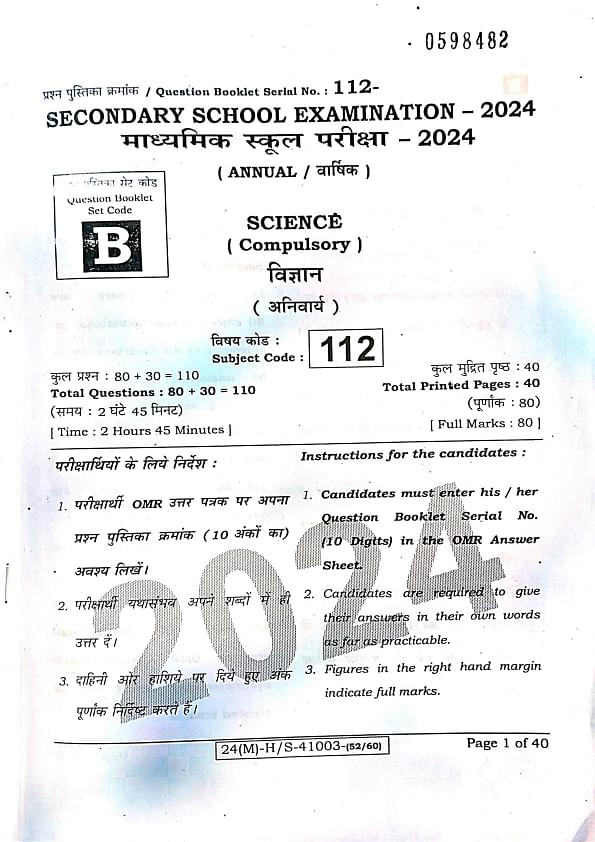




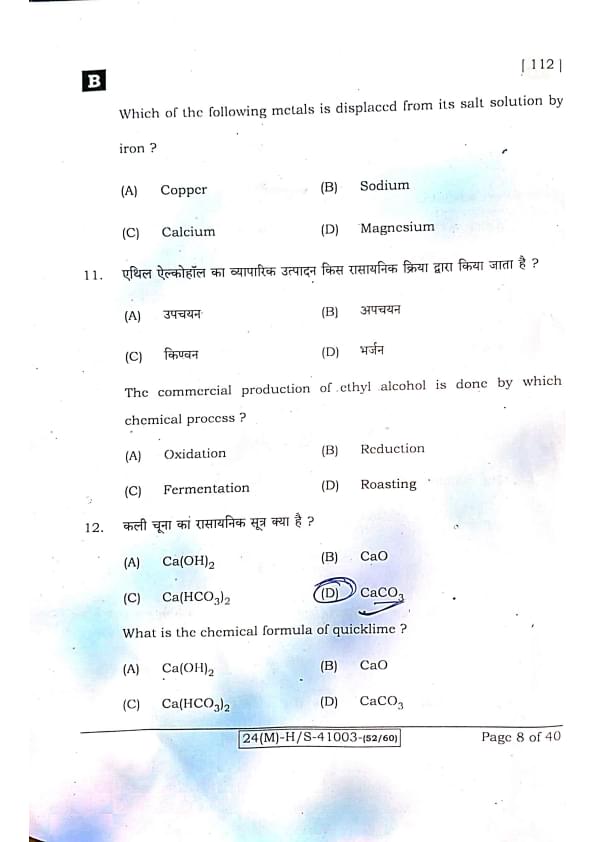


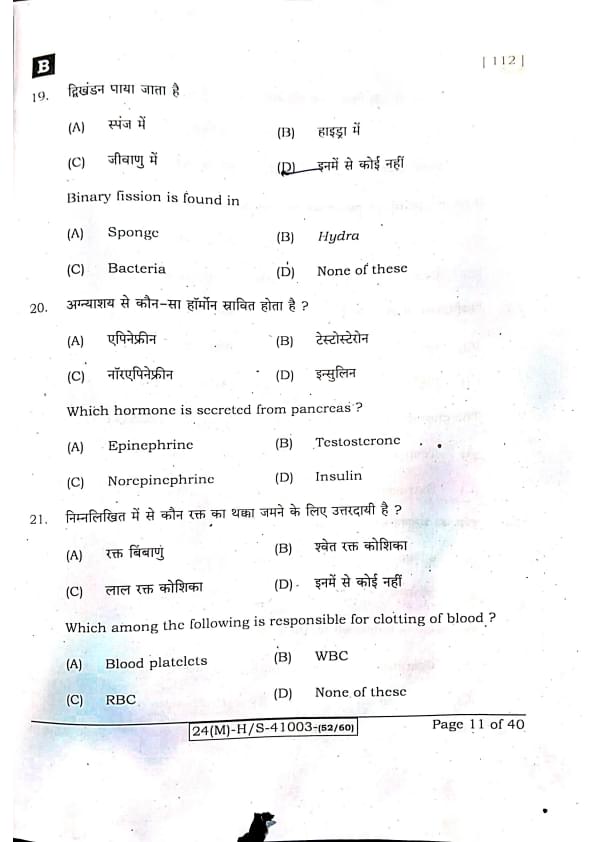

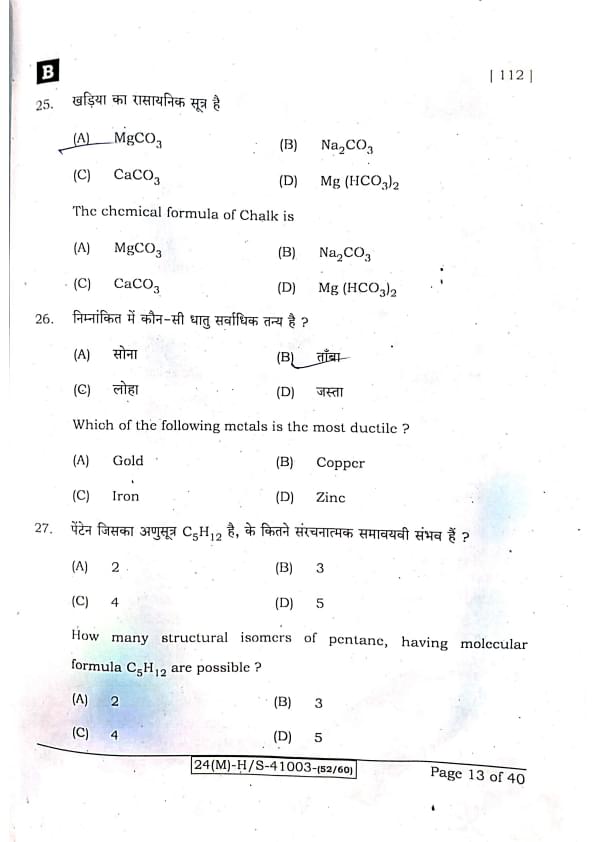
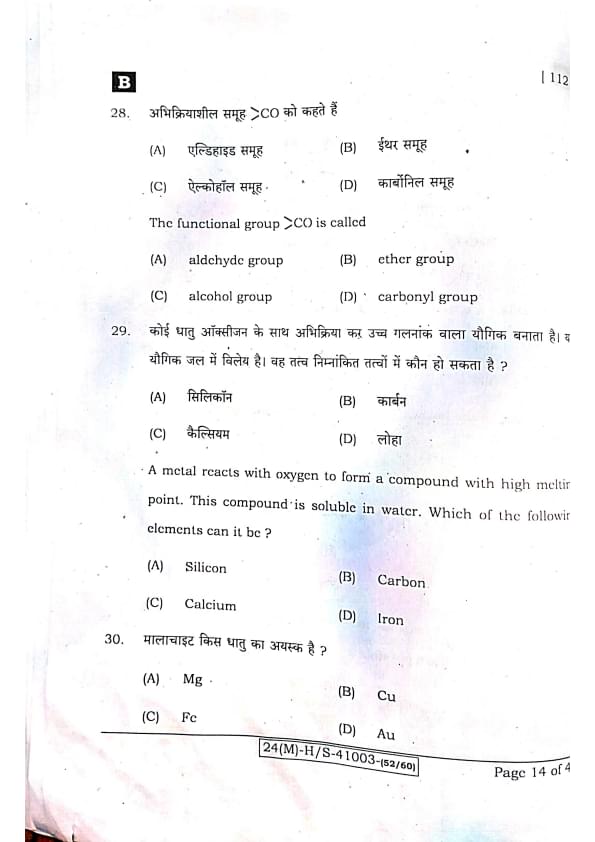
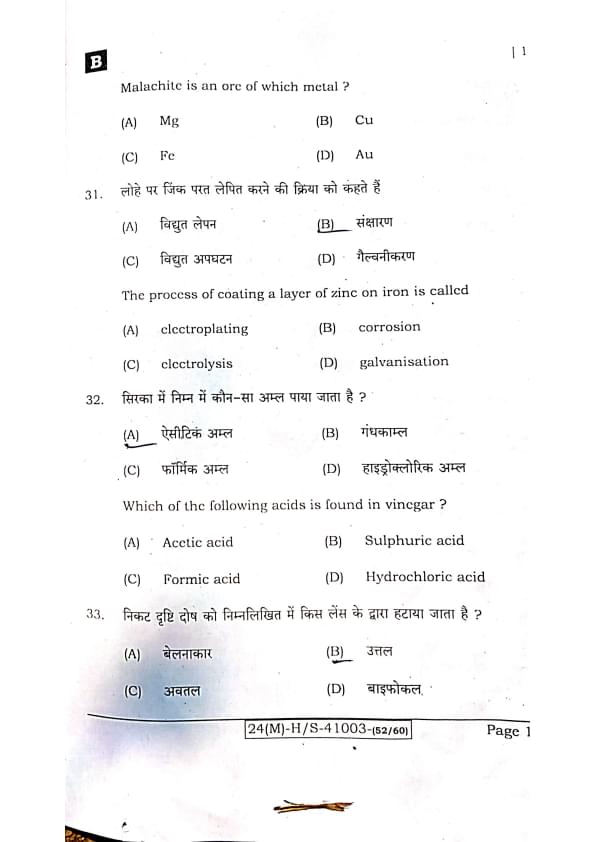
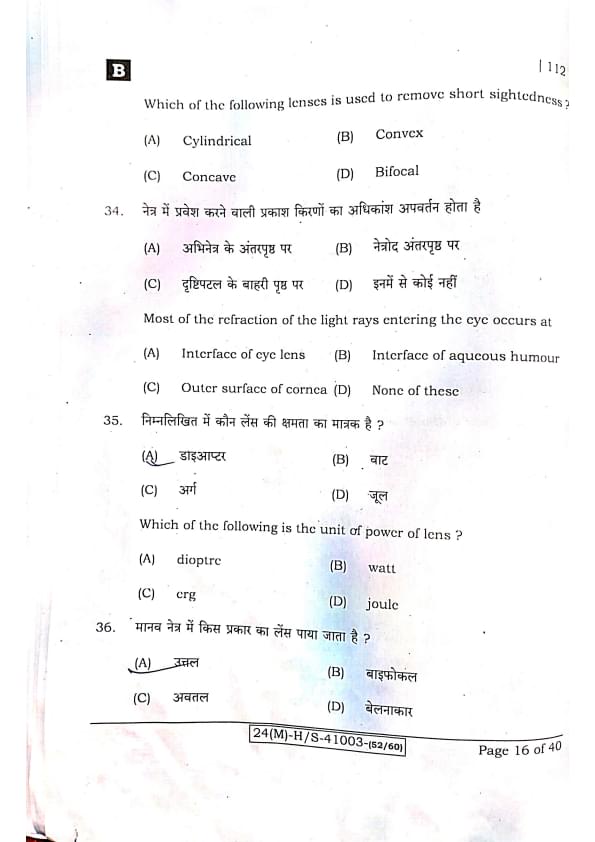
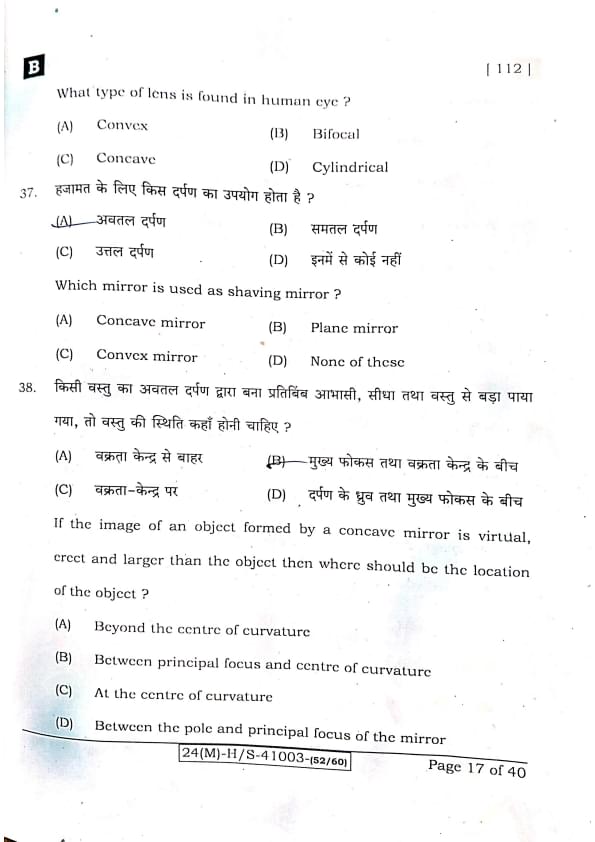
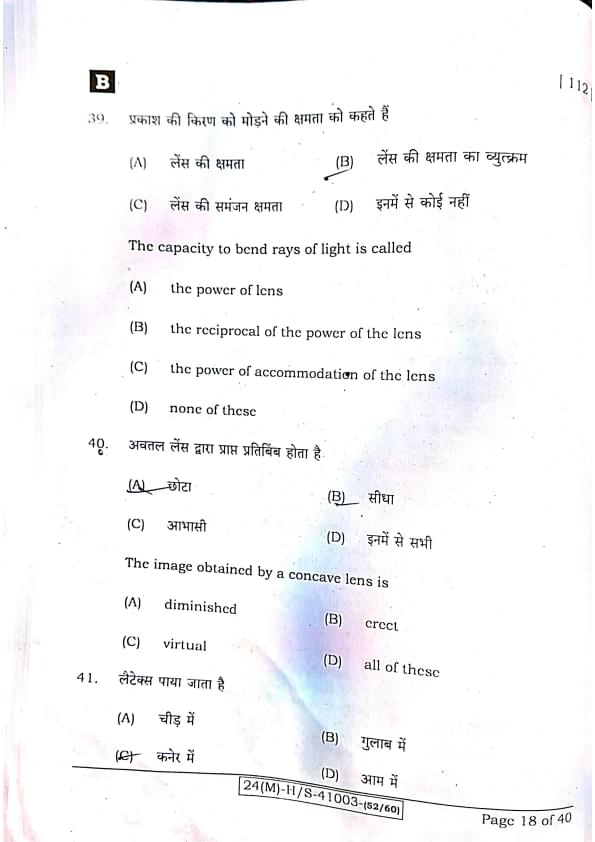
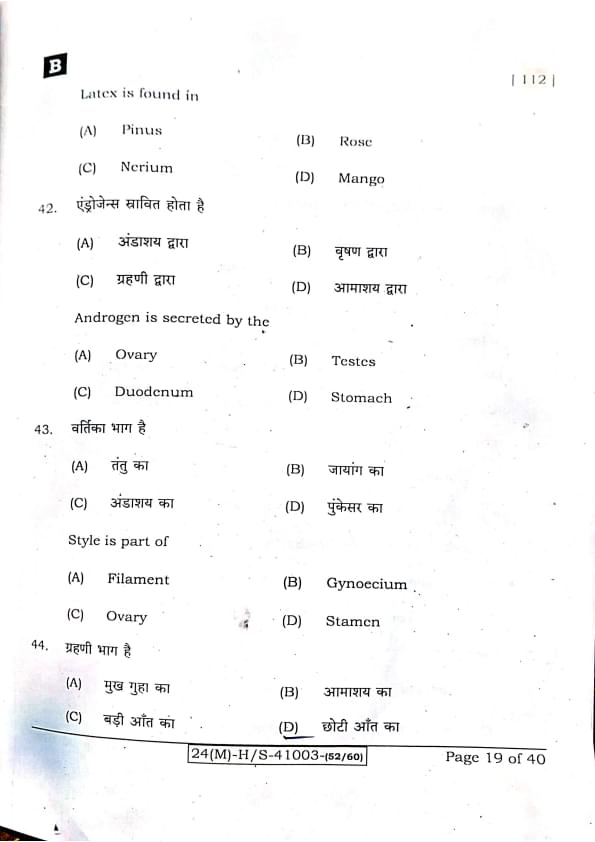
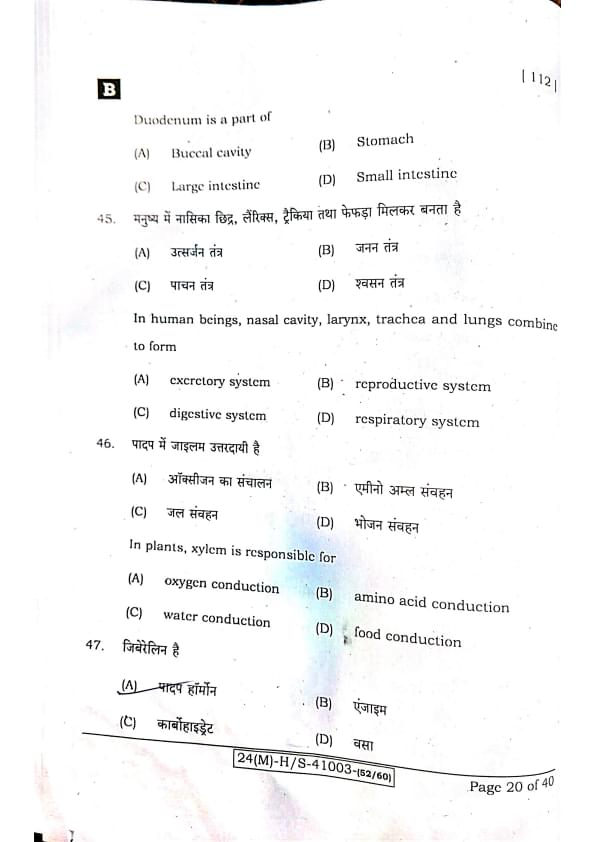
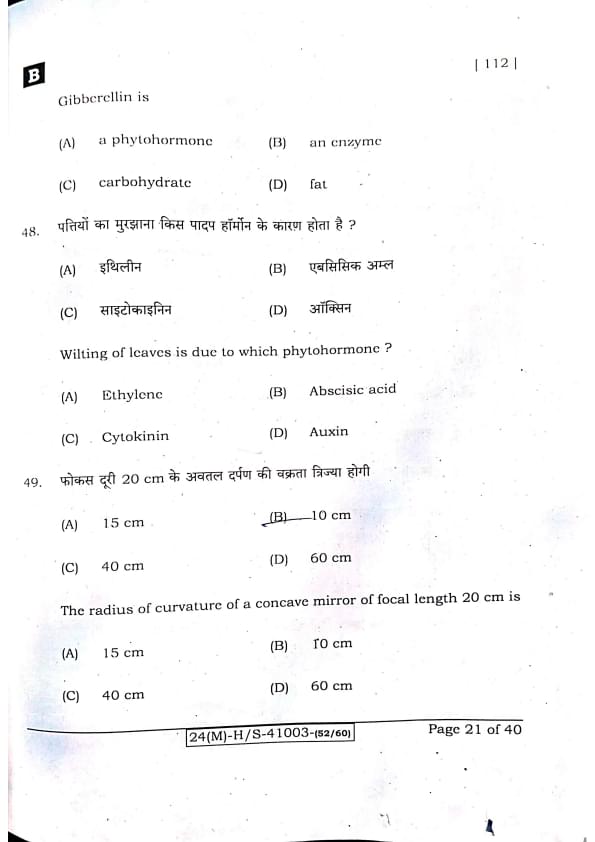
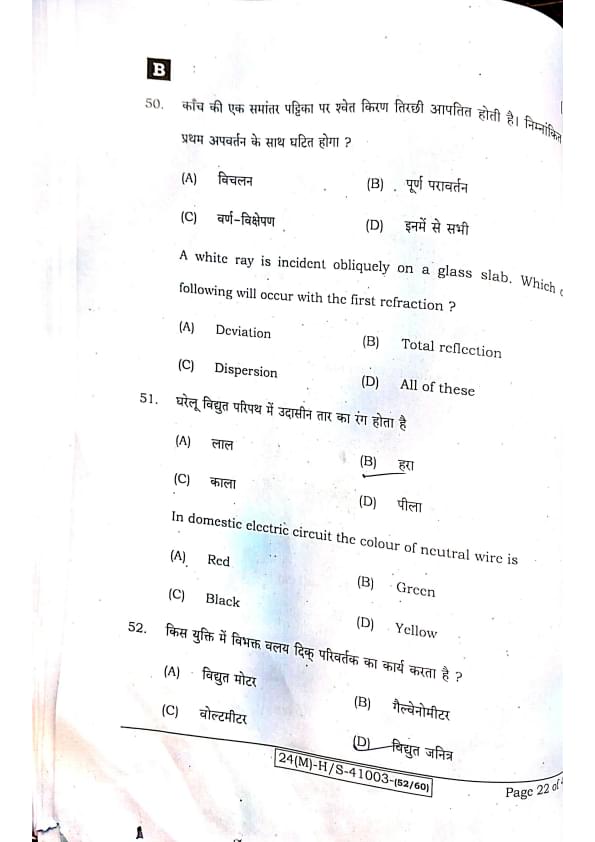
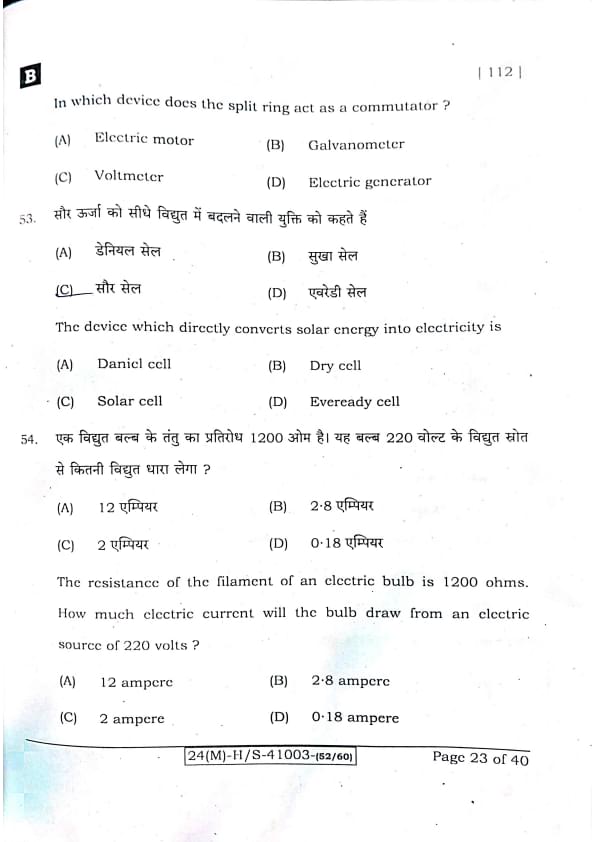
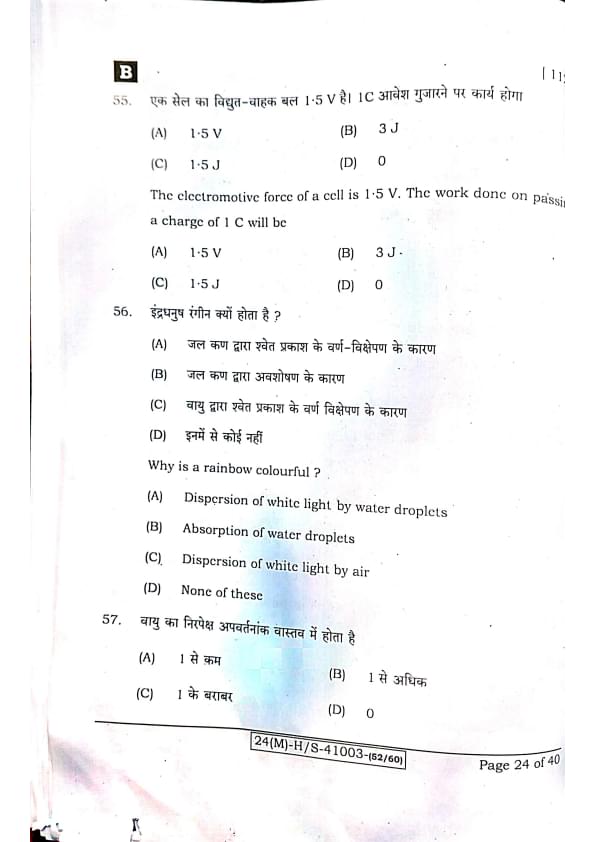
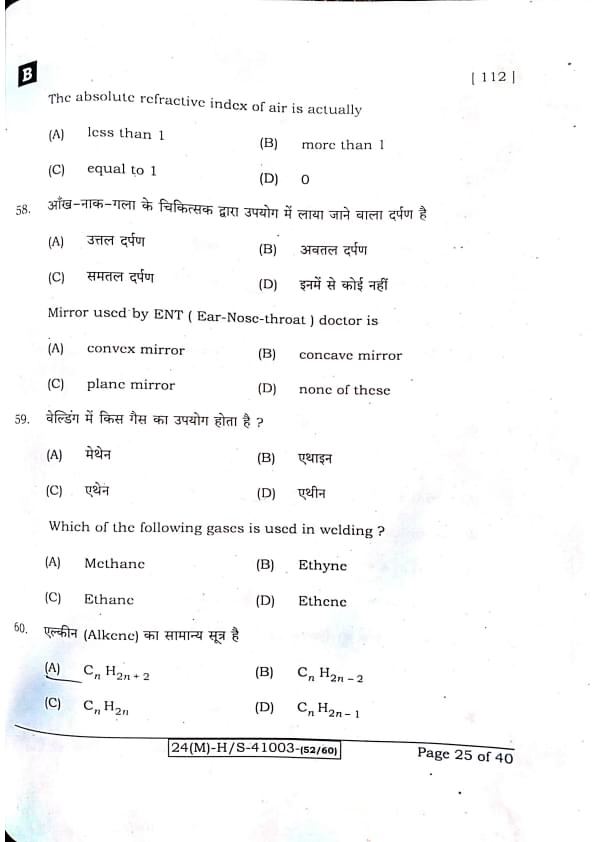
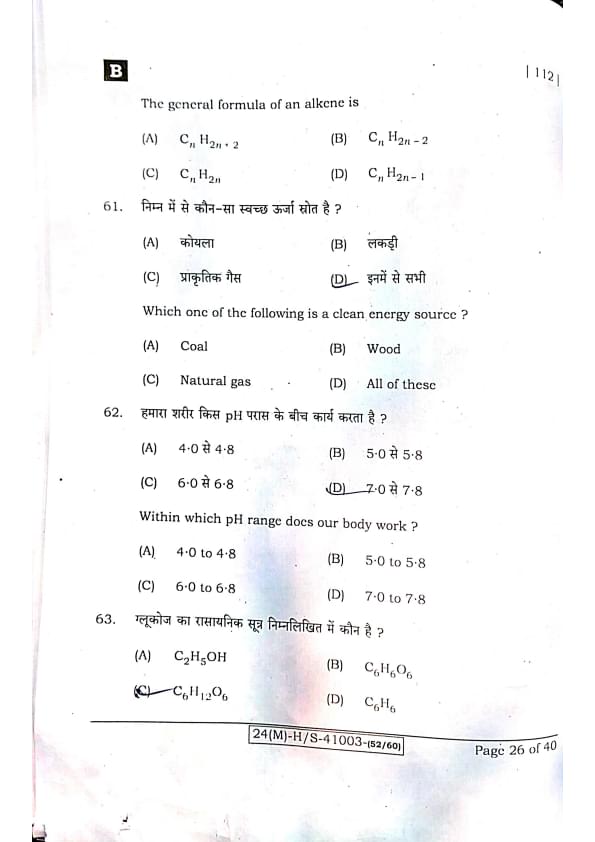
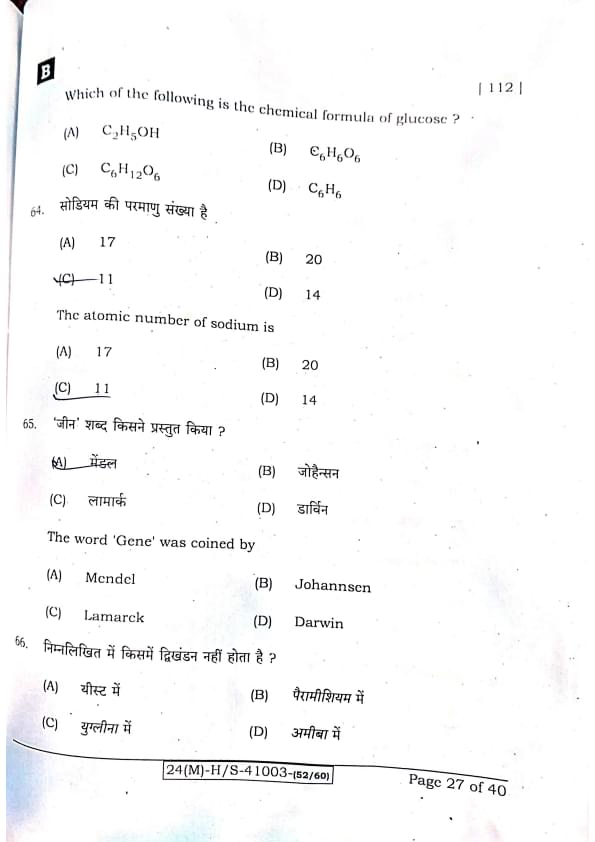
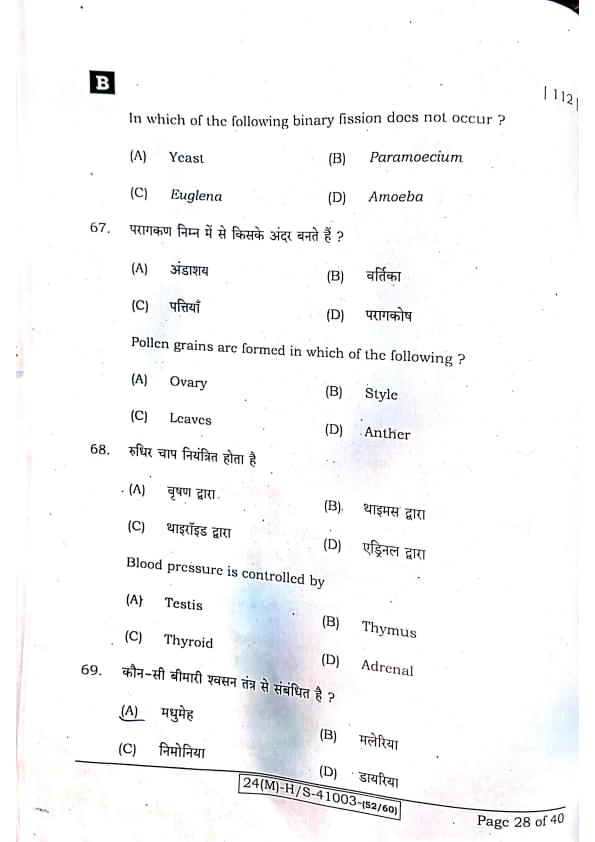
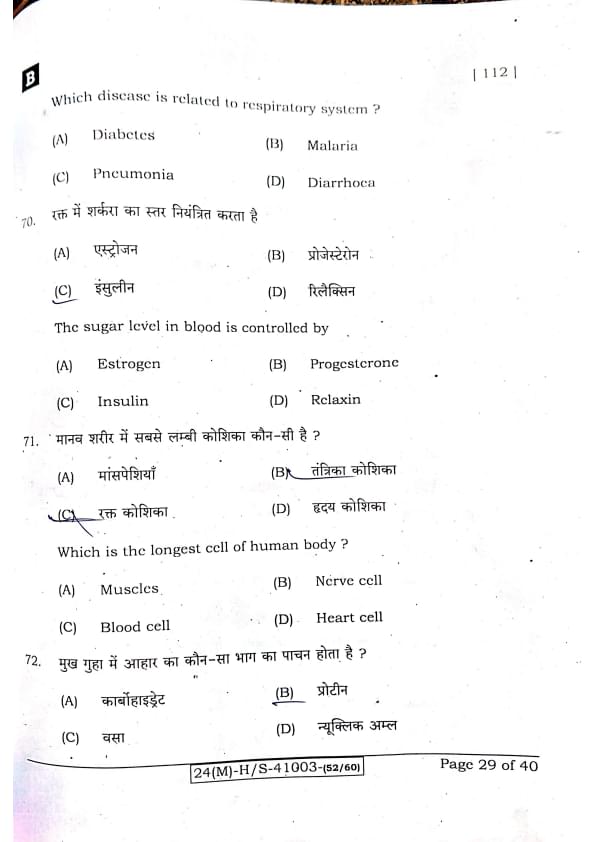
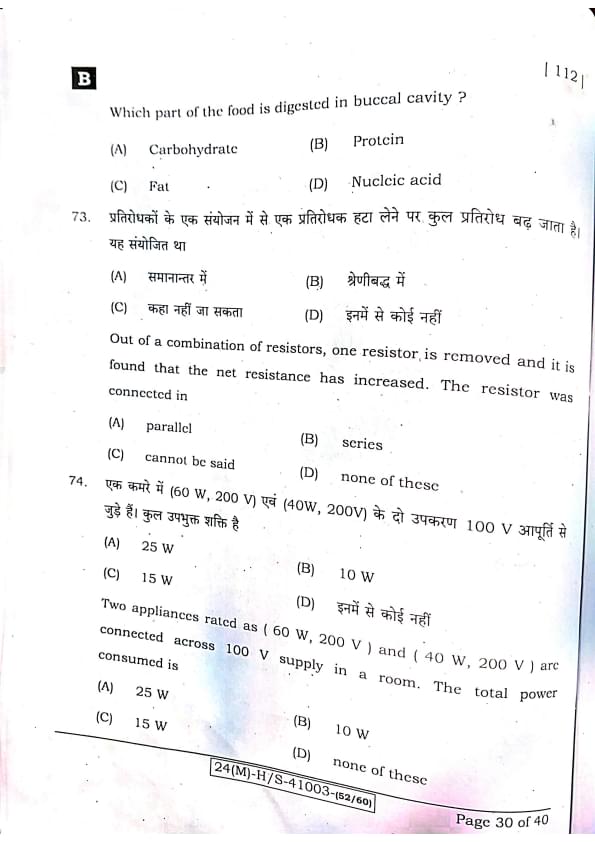
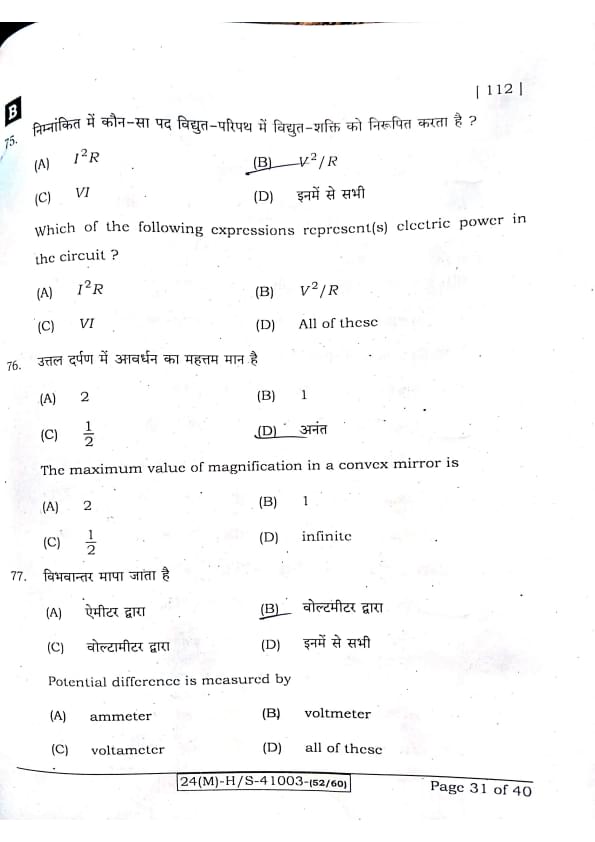
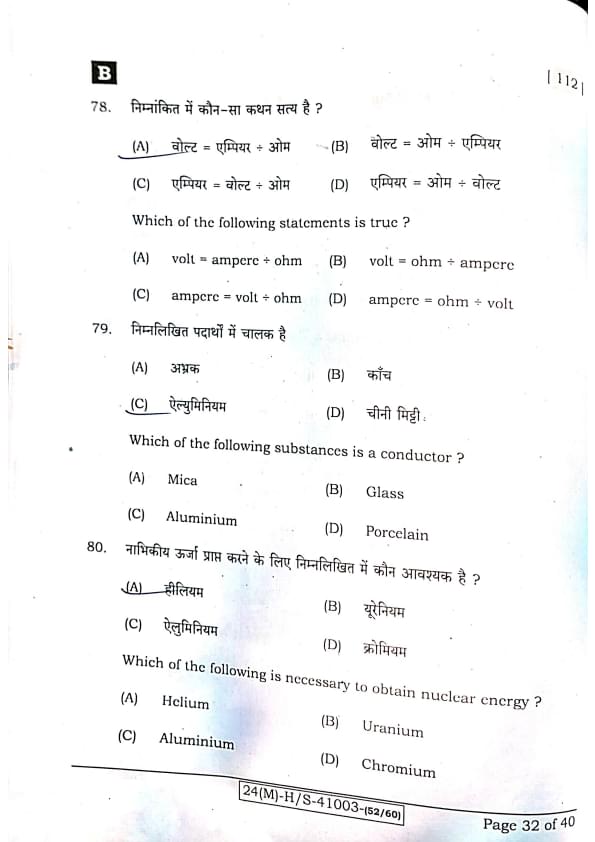



Comments